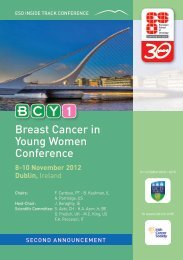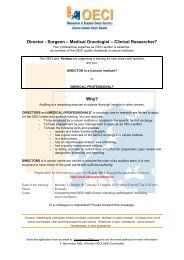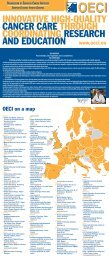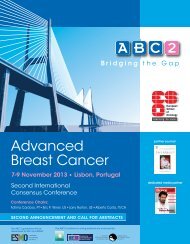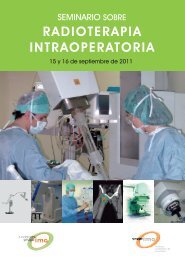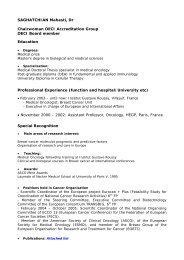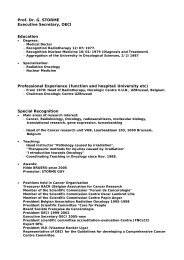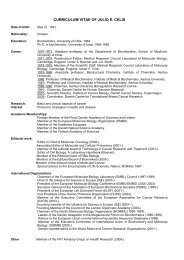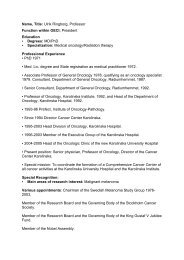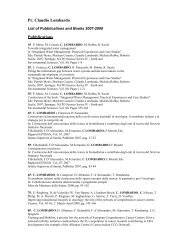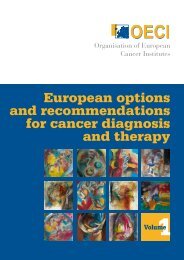Accreditation and Designation User Manual - OECI
Accreditation and Designation User Manual - OECI
Accreditation and Designation User Manual - OECI
You also want an ePaper? Increase the reach of your titles
YUMPU automatically turns print PDFs into web optimized ePapers that Google loves.
The keyword in the designation of European cancer institutes is the level of comprehensiveness of both professional<br />
infrastructure <strong>and</strong> performance. The philosophy behind comprehensiveness is:<br />
“If all relevant competences, skills, resources <strong>and</strong> tools concerning cancer care <strong>and</strong> research are brought together<br />
<strong>and</strong> integrated, it will lead to an outcome that is larger, on the whole, than the sum of its parts” (Ringborg, 2008).<br />
Comprehensiveness, in that sense, can be seen as the new basic principle on how cancer activities institutionally<br />
should be organised.<br />
Four different types of cancer institutes/organisations will be distinguished: Cancer Unit, (Specialised) Clinical<br />
Cancer Centre, Cancer Research Centre <strong>and</strong> Comprehensive Cancer Centre (CCC). The definition of each category<br />
is given in Table 1. The type of cancer organisation indicates the comprehensiveness of the services <strong>and</strong> the<br />
degree of specialisation.<br />
The objective of designation<br />
A designation system in combination with an exclusive <strong>OECI</strong> accreditation programme for each designation type<br />
of cancer centre will create platforms in which synchronization <strong>and</strong> benchmarking of cancer institutes will be<br />
possible on a European scale.<br />
Definitions of the designation categories are:<br />
− Cancer Units are defined as clinical facilities or hospital departments covering at least radiotherapy <strong>and</strong> medical<br />
or surgical oncology. Additionally they have a formalized collaboration with other hospital specialties.<br />
− The ‘Clinical Cancer Centre’ is characterised by the clinical capacity covering a sufficient degree of all medical,<br />
surgical <strong>and</strong> radiotherapy services <strong>and</strong> occasionally a limited degree of clinical research.<br />
− The ‘Cancer Research Centre’, is characterised by the capacity in cancer research focusing on one or more<br />
areas in the field of fundamental <strong>and</strong> translational oncology.<br />
− The ‘Comprehensive Cancer Centre’ (CCC) is probably the hardest category to define as many different<br />
interpretations on a CCC already exist. Based on available information <strong>and</strong> many definitions on the concept of<br />
a CCC, the following features are considered to be essential for this particular category:<br />
• A highly innovative character <strong>and</strong> multidisciplinary approach using the potential of basic, translational <strong>and</strong><br />
clinical research <strong>and</strong> clinical facilities <strong>and</strong> activities, organised in a sufficiently identifiable entity,<br />
• A direct provision of an extensive variety of<br />
cancer care tailored to the individual patient’s<br />
needs <strong>and</strong> directed towards learning <strong>and</strong><br />
improving the professional, organisational <strong>and</strong><br />
relational quality of care,<br />
• Broad activities in the area of prevention,<br />
education, <strong>and</strong> external dissemination<br />
of knowledge <strong>and</strong> innovation. In order to<br />
accentuate the differences with other cancer<br />
centres, a CCC separates itself in the following<br />
points:<br />
• High level of infrastructure, expertise<br />
<strong>and</strong> innovation in the field of oncology<br />
research,<br />
• Maintenance of an extensive network<br />
including all aspects of oncology treatment<br />
<strong>and</strong> research,<br />
• Related to an academic/university centre or<br />
is an academic centre.<br />
Glossary<br />
Both questionnaires contain a glossary (doc<br />
42). The intention of the glossary is to provide<br />
the user with the meaning of unclear or unknown<br />
words; for underst<strong>and</strong>ing <strong>and</strong> interpretation of the<br />
questions.<br />
Owner: <strong>OECI</strong> Organisation of European Cancer Institutes<br />
Status: Revised - 24 th January 2011 - A&D Working Group<br />
Approved by: <strong>OECI</strong> <strong>Accreditation</strong> <strong>and</strong> <strong>Designation</strong> Board<br />
Chapter 1 Introduction of the <strong>OECI</strong> A&D Programme<br />
Page 1 of 2<br />
Version 16 February 2011



